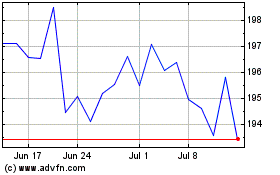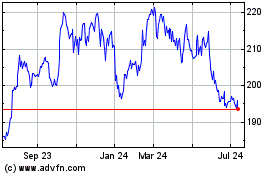UPDATE: Hedge Funds Gain 0.3%-0.8% In January, Trail S&P 500
February 07 2011 - 4:53PM
Dow Jones News
Hedge funds posted additional gains in January, though the
industry underperformed the broader U.S. stock market for the
second straight month.
The Hennessee Hedge Fund Index, compiled by hedge-fund adviser
Hennessee Group LLC, edged up 0.8% in January; another widely
followed index, Hedge Fund Research's HFRI Fund Weighted Composite
Index, gained 0.29%. The Standard & Poor's 500 rose 2.3% during
the period.
"A combination of civil unrest in Egypt and higher reserve
requirements at Chinese banks contributed to weakness across Asian
and Middle East equity markets," holding back gains in many index
funds, said Ken Heinz, president of Hedge Fund Research.
While hedge funds' January performance also trailed the 2.7%
advance of the Dow Jones Industrial Average for the period,
Hennessee said it was still a "decent start to the year."
"The general consensus among hedge-fund managers is that the
economy is improving and markets should continue to advance in the
short term," Hennessee co-founder Charles Gradante said. "That
said, managers are aware of several key macro risks, such as the
European sovereign debt crisis, emerging-market inflation, and
fiscal imbalances in the U.S., that have the potential to cause
volatility throughout the year."
Hedge funds employing event-driven strategies had the most gains
in January, rising 1.96%, and distressed and restructuring funds
gained 1.25% with contributions from exposures across U.S.,
European and global emerging markets, Hedge Fund Research said.
While hedge fund performance continued to lag behind the broad
market, investors continued to move money to the industry. TrimTabs
Investment research and BarclayHedge said funds saw their sixth
straight month of inflows in December, taking in an estimated $6.6
billion.
Analysts said hedge funds have been generating returns at a low
level of volatility.
"Hedge funds produced relatively better risk-adjusted returns
than traditional asset classes in 2010 as managers continued to
employ a diverse range of investment strategies. Overall hedge
funds posted returns on par with global equities with nearly a
quarter of the risk," according to the 2010 Hedge Fund Industry
Review conducted by Credit Suisse and Dow Jones Indexes. "This
risk/return profile is unique to hedge funds, suggesting the
incorporation of hedge funds into an overall portfolio allocation
could provide diversification benefits." Dow Jones Indexes, an
index provider best known for the Dow Jones Industrial Average, is
90% owned by CME Group Inc. (CME) and 10% by Dow Jones, which
publishes this newswire.
Hedge funds posted a risk-adjusted return, as calculated in a
measure called the Sharpe ratio, of 0.78 in 2010, higher than the
0.10 ratio for global equities. The higher the Sharpe ratio, the
better the risk-adjusted return.
The hedge-fund industry for the most part has regained its
footing since the financial crisis wiped out hundreds of billions
of dollars from its asset base. HFR last month said industry assets
reached $1.92 trillion at the end of December, just short of its
calculation of their $1.93 trillion peak in mid-2008. TrimTabs and
BarclayHedge estimated industry assets at $1.7 trillion, the
highest level they estimated since October 2008.
-By Amy Or, Dow Jones Newswires; +1 212 416 3142;
amy.or@dowjones.com
--Lauren Pollock contributed to this article.
CME (NASDAQ:CME)
Historical Stock Chart
From Jun 2024 to Jul 2024

CME (NASDAQ:CME)
Historical Stock Chart
From Jul 2023 to Jul 2024
